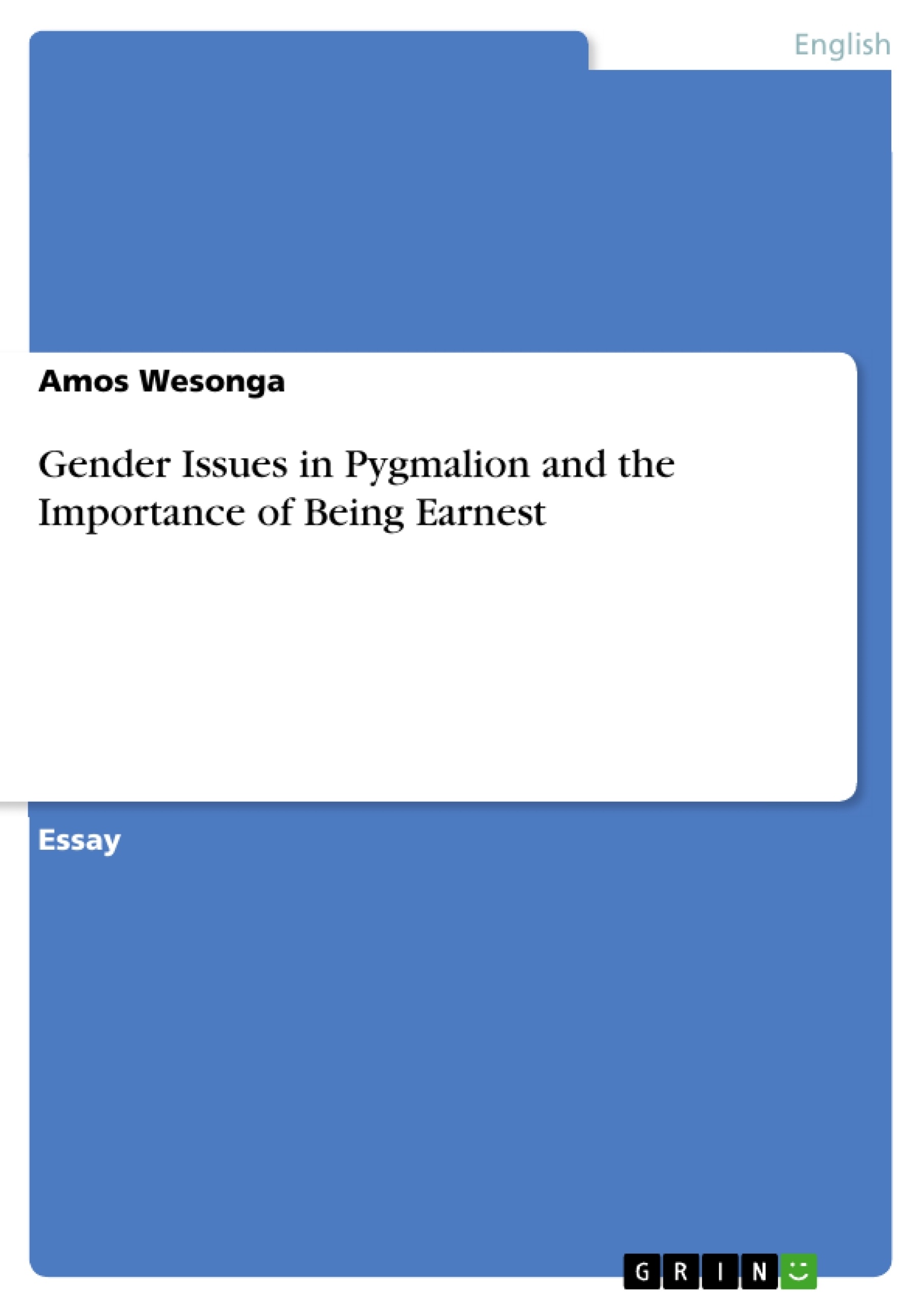Apparently, the general public was slanted to underestimate and command over ladies. Aside from directing their conduct and particular requirements of them, these ladies are likewise underrated. Notwithstanding when they have administration positions, they are as yet thought to be second rate compared to men. For example, it is clear from the two plays that fundamental rights like training and voting were not permitted to women. Also, both novels demonstrate that men needed to act more than moms; they looked down on women. Regardless of their enlivening and clatter for autonomy, the difficulties ladies need to persist are as yet incalculable
Inhaltsverzeichnis (Table of Contents)
- Gender Issues in Pygmalion and the Importance of Being Earnest
- The Challenges Faced by Women
- Marginalization and Societal Expectations
- The Role of Education
- Women in Positions of Power
- Lack of Appreciation for Women's Contributions
- The Gender Role Reversal
Zielsetzung und Themenschwerpunkte (Objectives and Key Themes)
This discussion aims to analyze the gender issues faced by women in Victorian society, as depicted in George Bernard Shaw's Pygmalion and Oscar Wilde's The Importance of Being Earnest. The analysis explores the limitations imposed on women by societal expectations, particularly regarding education, social standing, and power dynamics.
- Marginalization and Societal Expectations
- The Role of Education and its Impact on Women's Liberation
- Gender Roles and Power Dynamics in the Victorian Era
- The Reversal of Traditional Gender Roles and its Impact on Society
- The Lack of Appreciation for Women's Contributions to Society
Zusammenfassung der Kapitel (Chapter Summaries)
The essay explores the challenges faced by women in both plays, highlighting their societal constraints and the expectations imposed upon them. The analysis focuses on the themes of marginalization, education, power dynamics, and societal expectations.
The essay examines how Eliza Doolittle in Pygmalion experiences marginalization as a poor flower girl and how her pursuit of education through Higgins and Pickering reflects her desire for liberation from poverty. It contrasts Eliza's aspirations with Lady Bracknell's rigid views on women's education, showcasing the contrasting perspectives on the role of education in women's lives.
The essay also explores the dynamics of power and gender roles in both plays, examining how men hold positions of authority and influence, while women are often relegated to subservient roles. The essay analyzes Lady Bracknell's leadership position in The Importance of Being Earnest, emphasizing her defiance of traditional societal expectations and the challenges she faces in a male-dominated world.
Furthermore, the essay delves into the theme of societal expectations and the lack of appreciation for women's contributions. It highlights how Eliza's efforts in Pygmalion are disregarded by Higgins, and how women are often expected to conform to societal norms and expectations, with little recognition for their individual contributions.
Schlüsselwörter (Keywords)
The essay explores key themes such as gender issues, societal expectations, marginalization, education, power dynamics, gender roles, and the Victorian era. The analysis is grounded in the works of George Bernard Shaw's Pygmalion and Oscar Wilde's The Importance of Being Earnest.
Frequently Asked Questions
How are gender issues portrayed in George Bernard Shaw's "Pygmalion"?
The play explores the marginalization of women through Eliza Doolittle, highlighting how education and class expectations define a woman's social standing.
What is the role of Lady Bracknell in "The Importance of Being Earnest"?
Lady Bracknell represents a reversal of traditional roles, holding a position of power and authority while maintaining rigid, often hypocritical societal standards.
How did Victorian society view women's education?
Both plays show that formal education for women was often restricted or viewed with skepticism, as seen in Lady Bracknell's views or Eliza's struggle for liberation.
What is "gender role reversal" in these plays?
It refers to instances where female characters take on dominant roles or male characters exhibit traits traditionally seen as subservient, challenging Victorian norms.
Why are women's contributions often undervalued in these works?
The analysis shows that even when women achieve leadership or transformation, they are still considered inferior to men or their efforts (like Eliza's) are disregarded by male figures.
- Quote paper
- Dr. Amos Wesonga (Author), 2017, Gender Issues in Pygmalion and the Importance of Being Earnest, Munich, GRIN Verlag, https://www.grin.com/document/439519



